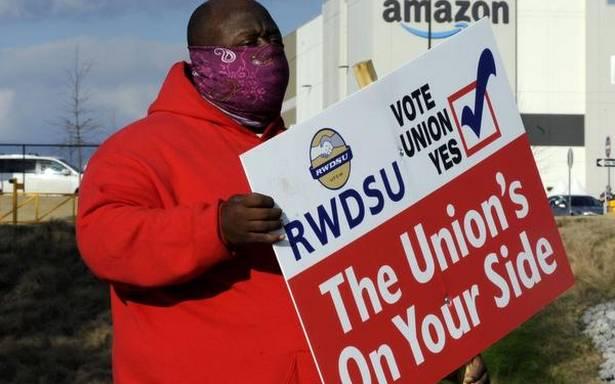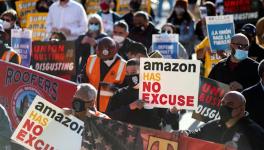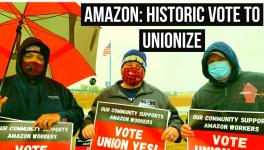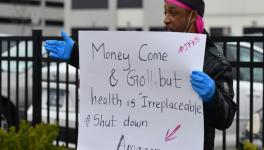In US, Amazon Faces Biggest Unionisation Push in its History

Image Courtesy: AP
New York: The second Jennifer Bates walks away from her post at the Amazon warehouse where she works, the clock starts ticking.
She has precisely 30 minutes to get to the cafeteria and back for her lunch break. That means traversing a warehouse the size of 14 football fields, which eats up precious time. She avoids bringing food from home because warming it up in the microwave would cost her even more minutes. Instead she opts for $4 cold sandwiches from the vending machine and hurries back to her post.
If she makes it, she's lucky. If she doesn't, Amazon could cut her pay, or worse, fire her.
It's that kind of pressure that has led some Amazon workers to organise the biggest unionisation push at the company since it was founded in 1995. And it's happening in the unlikeliest of places: Bessemer, Alabama, a state with laws that don't favour unions.
The stakes are high. If the organisers succeed in Bessemer, it could set off a chain reaction across Amazon's operations nationwide, with thousands more workers rising up and demanding better working conditions. But they face an uphill battle against the second-largest employer in the country with a history of crushing unionising efforts at its warehouses and its Whole Foods grocery stores.
Attempts by Amazon to delay the vote in Bessemer have failed. So too have the company's efforts to require in-person voting, which organisers argue would be unsafe during the pandemic. Mail-in voting started this week and will go on until the end of March. A majority of the 6,000 employees have to vote “yes" in order to unionise.
Amazon, whose profits and revenues have skyrocketed during the pandemic, has campaigned hard to convince workers that a union will only suck money from their paycheck with little benefit. Spokeswoman Rachael Lighty says the company already offers them what unions want: benefits, career growth and pay that starts at $15 an hour. She adds that the organisers don't represent the majority of Amazon employees' views.
Bates makes $15.30 an hour unpacking boxes of deodorant, clothing and countless other items that are eventually shipped to Amazon shoppers. The job, which the 48-year-old started in May, has her on her feet for most of her 10-hour shifts. Besides lunch, Bates says trips to the bathroom are also closely monitored, as is getting a drink of water or fetching a fresh pair of work gloves. Amazon denies that, saying it offers two 30-minute breaks during each shift and extra time to use the bathroom or get water.
Fed up, Bates and a group of workers reached out to the Retail, Wholesale and Department Store Union last summer. She hopes the union, which also represents poultry plant workers in Alabama, will mandate more breaks, prevent Amazon from firing workers for mundane reasons and push for higher pay.
“They will be a voice when we don't have one,” Bates says.
But according to Sylvia Allegretto, an economist and co-chair of the Center on Wage and Employment Dynamics at the University of California, Berkeley, “history tells us not to be optimistic.”
The last time Amazon workers voted on whether they wanted to unionise was in 2014, and it was a much smaller group: 30 employees at an Amazon warehouse in Delaware who ultimately turned it down. Amazon currently employs nearly 1.3 million people worldwide.
Also working against the unionising effort is that it's happening in Republican-controlled Alabama, which generally isn't friendly to organised labour. Alabama is one of 27 right-to-work states where workers don't have to join unions when hired. In fact, the state is home to the only Mercedes-Benz plant in the world that isn't unionised.
That the union push at the Bessemer warehouse has even gotten this far is likely due to who the organisers are, says Michael Innis-Jiménez, an associate professor at the University of Alabama. Companies typically villainise union organisers as out-of-staters who don't know what workers want. But the retail union has an office in nearby Birmingham and many of the organisers are Black, like the workers in the Bessemer warehouse.
Get the latest reports & analysis with people's perspective on Protests, movements & deep analytical videos, discussions of the current affairs in your Telegram app. Subscribe to NewsClick's Telegram channel & get Real-Time updates on stories, as they get published on our website.


















